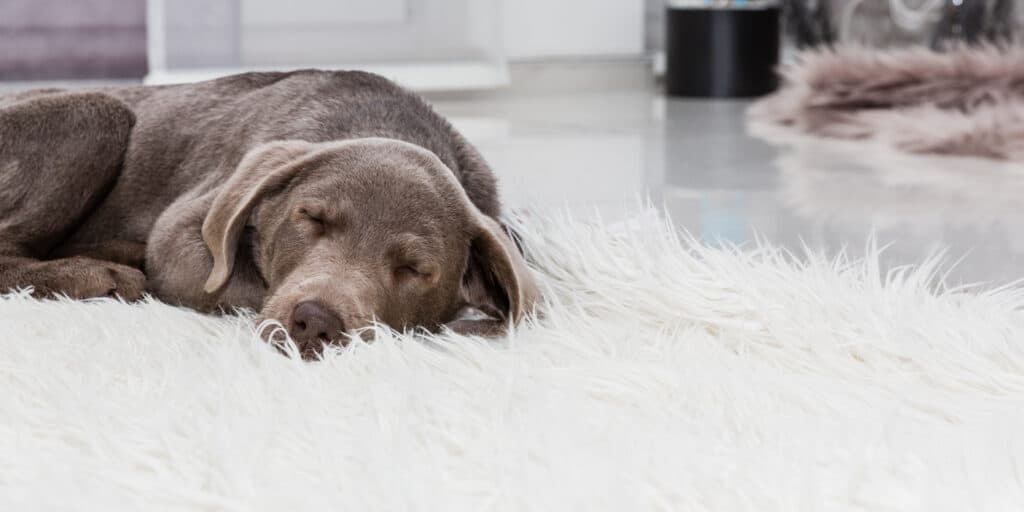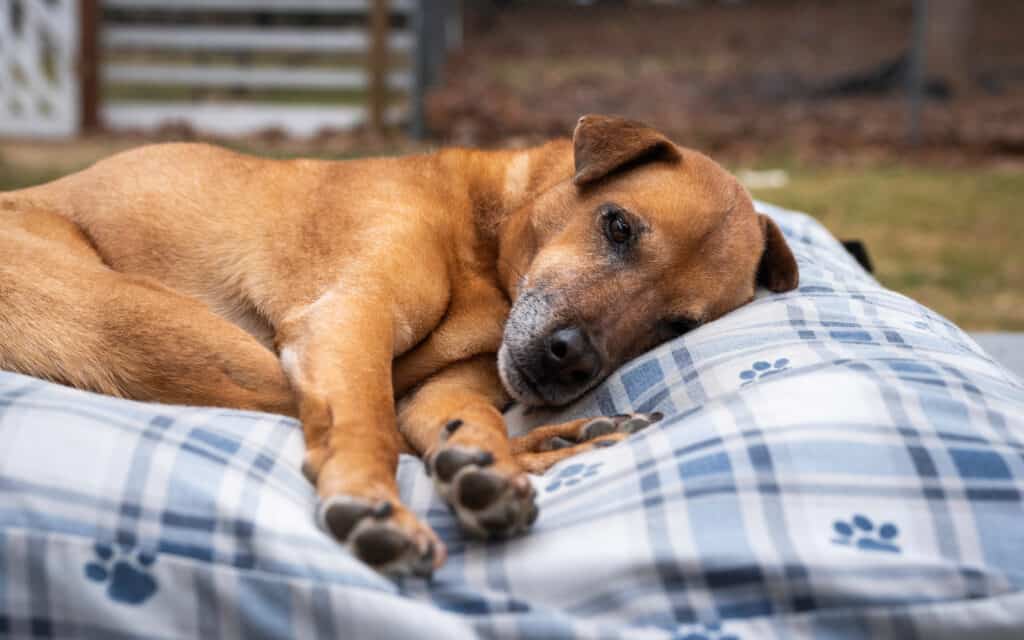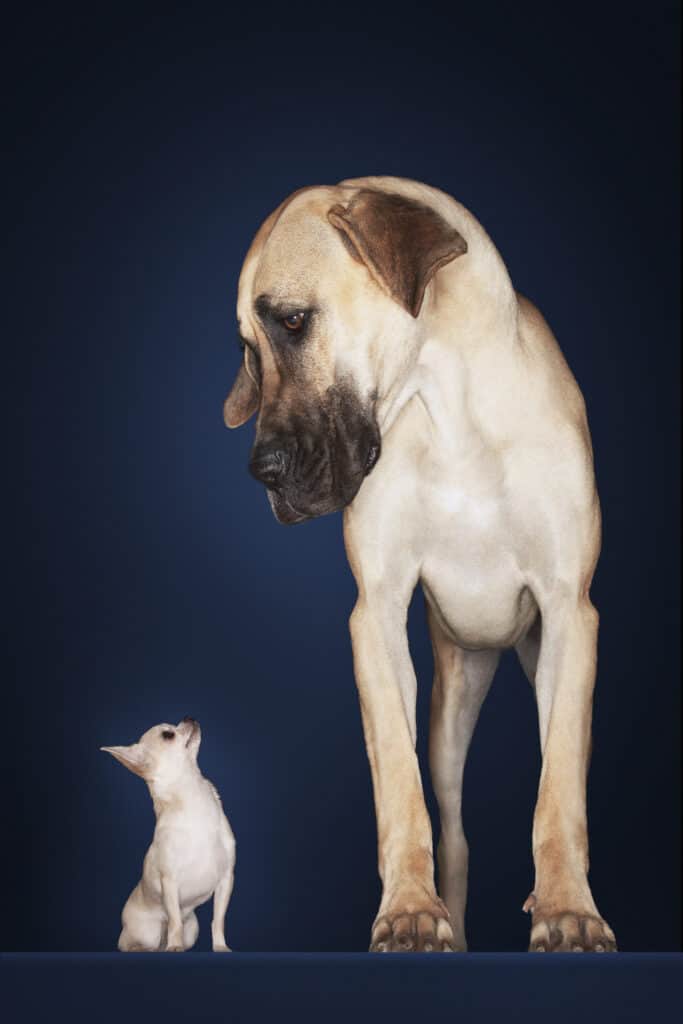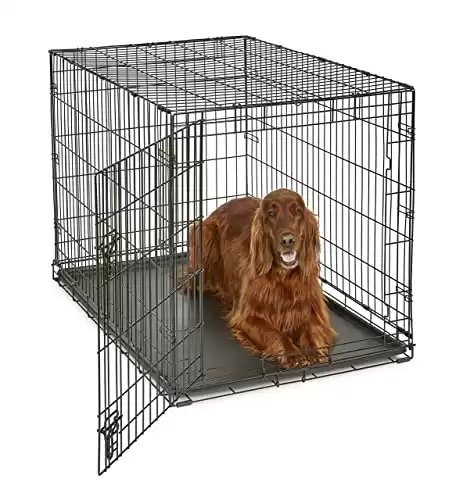Dogs live simple and enjoyable lives. In most cases, they just sleep, eat, play, then sleep some more. Dogs sleep so much that many people start to wonder and ask questions like, “How much sleep does a dog need?”
The truth is that dogs need a lot of sleep. Their sleep pattern differs from ours, so it’ll be wrong to base how much sleep they need on our sleeping habits. How many hours of sleep would be ideal for your dog depends on many factors, including their age, breed, size, and general health. Environmental factors such as your dog’s lifestyle and location can also affect how much sleep your dog can get per day. Read on to discover how much sleep your dog really needs.
How Much Sleep Do Dogs Need?
It’s hard to estimate the hours of sleep your dog should get per day since it depends on several factors. What we do know is that dogs need more sleep than humans do. In fact, dogs sleep even more than other animals like cows, sheep, and other herbivores. They evolved from carnivorous predators, which means sleeping for long is less risky for them compared to prey animals.
The two most important factors determining how much sleep your dog should be getting include the age and breed of the dog in question.

Being evolved from carnivorous animals, dogs need more sleep than cows, sheep, and other herbivore animals.
©bmf-foto.de/Shutterstock.com
Age
When estimating how much sleep your dog should be getting, age is perhaps the most significant factor to consider. Generally, puppies and senior dogs need more sleep. They may rest for as much as 20 hours per day. Adult dogs are more active, which means they need less time to sleep each day.
Puppies
Experts recommended up to 18 hours of sleep for puppies per day. However, they may sleep more (as much as 20 hours) depending on how much sleep they get at night. Puppies generally sleep throughout the day, only taking short breaks to eat and play. They sleep less at night compared to adult dogs. The majority of puppies sleep in a crate or kennel. Young dogs run around during the day, burning up all their energy, then they’ll crash and sleep for their body to recover again.
- Comes in multiple sizes
- Features security measures to prevent break-outs
- Easy to clean
- Fully portable
Adult Dogs
Adult dogs get less sleep compared to seniors and puppies. Generally, they get between 8 to 14 hours of sleep per day, with an average estimate of about 11 hours for most adults. While this is significantly less than what seniors or puppy dogs get, it is still more than the average human’s sleep (between 7 – 8 hours). Unlike puppies, adult dogs sleep more at night than during the day. They may use 60-80% of the time between 8 pm and 8 am to sleep. Their sleep schedule at night is more similar to that of their human owners. However, adult dogs still spend a significant part of their day sleeping. Dogs typically start sleeping in a dog bed when they’re about a year old.
- Available in 5 sizes and 4 colors
- Constructed from 3" high-density egg crate foam
- Distributes your dog's weight evenly for maximum comfort and support
- This sofa-style bed features 3 bolstered side pillows for neck and head support
- The sleep surface is made of soft, cozy flannel
Senior Dogs
Senior dogs spend more of their time sleeping than even puppies do. They tend to sleep more during the night, and they frequently nap throughout the day as well. Senior dogs can sleep for as much as 20 hours per day. Senior dogs need more sleep to recover from their daily activities. They’re also more likely to suffer from health issues that make them sleep more.
| Dog Age | Sleep Duration |
| Puppies | 18-20 hours |
| Adult Dogs | 8-14 hours |
| Senior Dogs | 20 hours |

Unsurprisingly, older dogs tend to need more sleep than younger dogs.
©NayaDadara/Shutterstock.com
Dog Breed/Size
Your dog’s breed is another factor determining how many hours of sleep it needs to stay healthy. Generally, large dog breeds such as Great Danes and mastiffs sleep more. They may nap for as much as 18 hours per day. Medium-sized breeds like poodles and terriers need between 10 to 14 hours of sleep per day. Small dogs or toy breeds sleep more than medium dogs. They typically get between 14 to 16 hours of sleep a day.
The specific breed of your dog may also determine how much sleep it needs. Home breeds like huskies tend to sleep more than active, high-energy dog breeds like Golden Retrievers and Boxers. Similarly, dogs trained for service and active duty tend to get less sleep than other breeds.
| Dog Size | Sleep duration |
| Large Dog Breeds | 18 hours |
| Medium Dog Breeds | 10-14 hours |
| Small Dog Breeds | 14 to 16 hours |

Just as older dogs need more sleep than younger dogs, bigger dogs need more sleep than smaller dogs.
©sirtravelalot/Shutterstock.com
Other Factors That Determine How Long Your Dog Will Sleep
In addition to size and age, other factors may influence how long your dog will sleep. Generally, your dog’s lifestyle, surroundings, and health can also determine how much sleep they get.
Exercise
Just like exercising helps people sleep more, your dog’s activity during the day may also impact how well they sleep. Dogs that are active during the day use up all their energy. This helps them sleep better at night. If your dog still has a lot of pent-up energy, it’ll have difficulty falling asleep during bedtime.
Environment
Your dog’s immediate environment is another factor that can impact how much sleep they can get. In homes with several pets and other family members, your pup might find it difficult to get the sleep it needs.
Also, if you live in a noisy neighborhood where parties, fireworks, or factory noises are frequent, your dog is likely to be anxious most of the time, making it difficult to fall asleep.
Health
Underlying health issues may disrupt your dog’s sleep. While certain conditions inhibit sleep, others will make your pooch sleep more. For instance, while conditions like Narcolepsy can make your dog sleep more during the day, metabolic diseases like diabetes make it more difficult for dogs to sleep.
Similarly, health issues that cause discomforts like joint pain, itchiness, and respiratory issues can make it difficult for your dog to fall asleep. Dogs may also suffer from sleep disorders like sleep apnea and REM Sleep Behavior Disorder in Dogs that disrupt sleep patterns directly.
Is Your Dog Getting Enough Sleep?
So how do you know if your dog is getting enough sleep? This can be difficult to determine since the sleeping pattern of dogs is different compared to humans. Dogs can also adapt to different situations and may find other ways to get the sleep they need. For instance, dogs that live in busy environments where they don’t get enough sleep during the day may adapt to start getting most of their sleep at night.
So how do you determine if your dog is getting enough sleep? Generally, it would help to watch your dog’s behavior regularly for signs of sleep deprivation. Dogs that get sufficient sleep are generally more relaxed and happier. Thus, if your dog seems to be showing symptoms like irritability, mood disturbance, and intense reactions to stress, there’s a good chance it isn’t getting enough sleep.
Conclusion
As a pet parent, one of the things you have to pay attention to is how much sleep your pet is getting. By learning about sleep patterns in dogs, you’ll be able to understand changes in your dog’s habits and know when there are reasons for concerns.
Bonus: Should You Allow Your Dog to Sleep With You?

In most cases, sleeping with your dog is just fine.
©yacobchuk/ via Getty Images
If your dog sleeps with you – you are not alone – almost half of all dog owners share their bed with their pet. Don’t be ashamed of it! Research has proven that there are many benefits to snuggling with your dog or providing a bed for your pet in your bedroom.
Sleeping in the same bed or room with your dog is nothing new – throughout history, many cultures considered co-sleeping with dogs to be beneficial. The animals provided warmth and protection by being alert to danger. Maybe that was necessary in the past – but what about now? The same qualities that offered security to people in the past can affect the quality of our sleep now. Dogs are light sleepers and may wake more often than their humans. If that puts a crimp in your sleep cycle – perhaps your dog could sleep in its own bed right beside yours.
If your dog is a well-behaved pet it should be fine to allow it to sleep with you. There are many physical and mental advantages to having a pet and the more time you spend together – the better. Your dog will be delighted to hop in bed with you – and it should increase the feelings of love and companionship between you both.
The photo featured at the top of this post is © Kuznetsov Alexey/Shutterstock.com
Ready to discover the top 10 cutest dog breeds in the entire world?
How about the fastest dogs, the largest dogs and those that are -- quite frankly -- just the kindest dogs on the planet? Each day, AZ Animals sends out lists just like this to our thousands of email subscribers. And the best part? It's FREE. Join today by entering your email below.
Thank you for reading! Have some feedback for us? Contact the AZ Animals editorial team.








